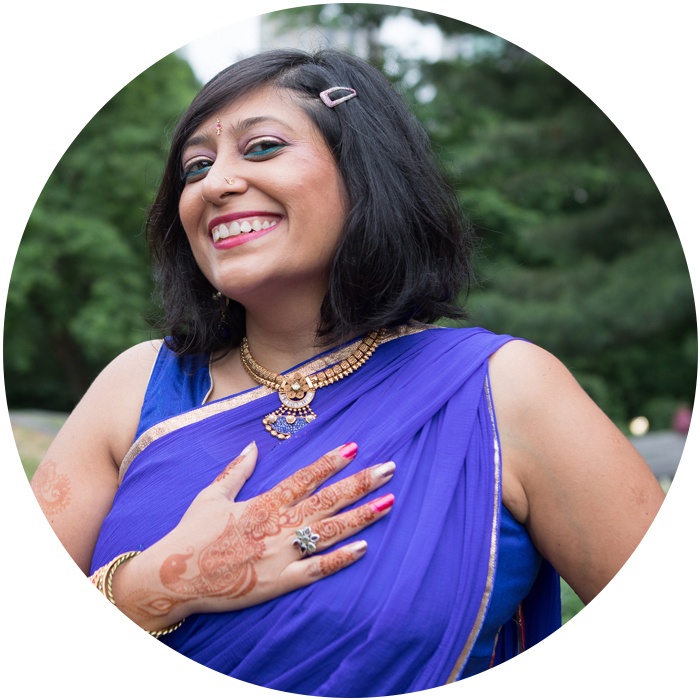Purvi Shah
The poet enters the game of lila
There is an old Sanskrit word, Lila (Leela), which means play. Richer than our word, it means divine play, the play of creation and destruction and re-creation, the folding and unfolding of the cosmos.
— Stephen Nachmanovitch, Free Play: Improvisation in Life and Art
Mud as if you are
being made & the mud is too. In dead
bed of quenched river, you see
a tiger’s eye, graffiti
across every hearth
barred to girls, a swami’s shed
skin, rows of tanks
seeking a water
source, blue
mountains of
ancestors.
❁
Saraswati raises
her bangle — a stream
spills into empty frames, sudden
gossip of girls at a summer
pool, clarinets chirping.
❁
Your bangle, wet
with absences,
churns
more stories
than our stars themselves.
❁
Your bedroom mirror goes dark.
Too many rivers with new
names.
❁
You hear the voices of women who never
drowned, who could actually
never be
drowned. You touch
your skin and mark
a ghost, perhaps
too many to count.
The poet enters the game of lila & marks a number
There is an old Sanskrit word, Lila (Leela), which means play. Richer than our word, it means divine play, the play of creation and destruction and re-creation, the folding and unfolding of the cosmos. Lila, free and deep, is both delight and enjoyment of this moment, and the play of God. It also means love.
— Stephen Nachmanovitch, Free Play: Improvisation in Life and Art
In some accounts, you
are not even you.
❁
Memory must be made before it can be erased.
❁
Mark:
some ancestors I have chosen & some have chosen me. I came
from the East — as you attest — in
a lyric to the West.
❁
Witness:
sparrows crushed
from migrations,
bangle of black
pulse, a train’s hum —
nestled
at the curve of your lumbar
a once silk,
opening.
Artist's Statement
In many places, surviving birth as a girl child is a miracle. In 2018, given skewed birth ratios of girls and boys, government officials in India reported that more than 63 million women are “missing.” Everywhere, a girl is a miracle mark. Especially a girl writing — given that (after birth) formal education is not guaranteed. These two poems evoke lineages, including our missing ones. They are part of a five-poem series from Miracle Marks, my new book, which explores women, the sacred, and gender & racial equity through prisms of Hindu iconography. A circle dance of devotion, the raas lila. The circularity of devotion, of gender, of marking and being marked. Missing girls, missing holy rivers, a goddess of arts, echoes of a poet saint, forms of illusion. Poetry as play, the play of women, the play of gender, the play of divinity. Language is an ancestor. Language is energy. Language is embodiment of the feminine divine. Language is lila. Let’s play.
 Purvi Shah inspires change as a writer and nonprofit consultant on gender, racial, and economic equity. She has developed nine short films, including What Creates Change?, and designed community-based programming for healing through Movement to Power, a creative workshop series for survivors of violence and community members. Her debut collection, Terrain Tracks, explores migration and belonging. Her second book of poetry, on women and the sacred, Miracle Marks, is forthcoming in June 2019 from Northwestern University Press. Her favorite art practice is her sparkly eyeshadow. Discover more @PurviPoets or at purvipoets.net.
• Photo by Neha Gautam.
Purvi Shah inspires change as a writer and nonprofit consultant on gender, racial, and economic equity. She has developed nine short films, including What Creates Change?, and designed community-based programming for healing through Movement to Power, a creative workshop series for survivors of violence and community members. Her debut collection, Terrain Tracks, explores migration and belonging. Her second book of poetry, on women and the sacred, Miracle Marks, is forthcoming in June 2019 from Northwestern University Press. Her favorite art practice is her sparkly eyeshadow. Discover more @PurviPoets or at purvipoets.net.
• Photo by Neha Gautam.